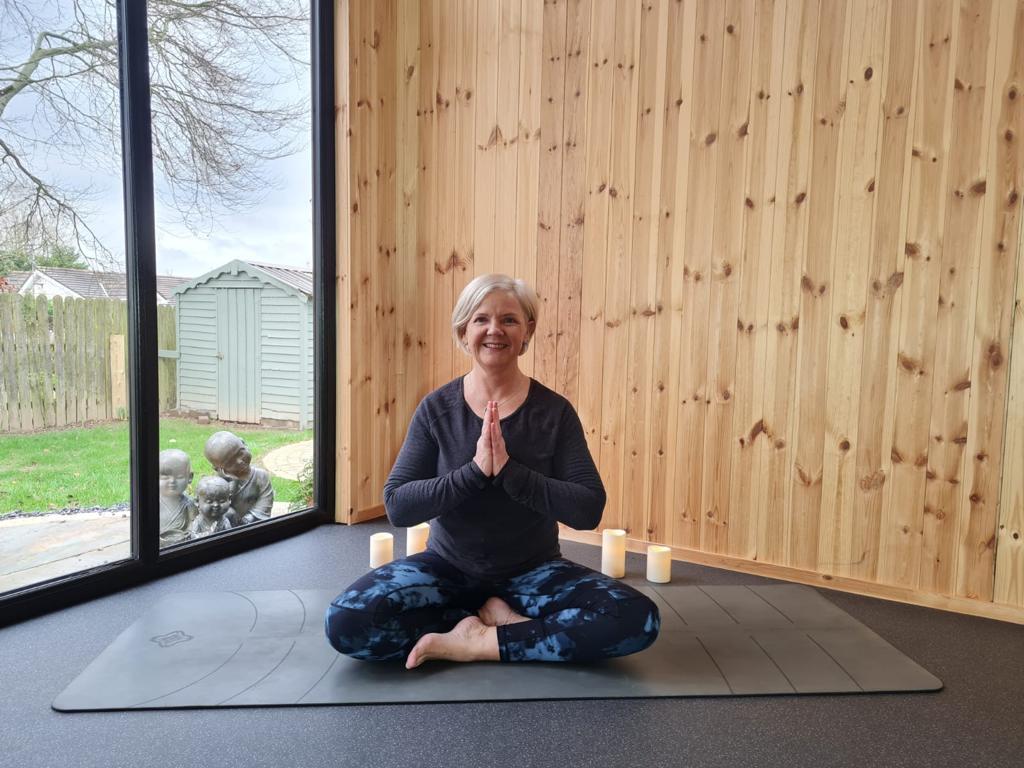meditation
“Mindfulness means paying attention in a particular way; On purpose, in the present moment, and non-judgmentally”
Kabat-Zinn
With Carmel
This class is currently unavailable

What Is Meditation?
“Straightforward and Simple (but not easy), meditation is essentially training our attention so that we can be more aware – not only of our own inner workings but also of what’s happening around us in the here and now. Once we see clearly what’s going on in the moment, we can then choose whether and how to act on what we’re seeing.”
Sharon Salzberg
The practice of Meditation actually dates back thousands of years. The practice has been associated with every major religious tradition, particularly Buddhism. However today many people practice meditation independently of any religious or spiritual beliefs or practices.
There are many different types of meditation and the practices I am most familiar with are Mindfulness Meditation, Nama Japa or Mantra and Loving Kindness Meditation.
Mindfulness Meditation: Mindfulness is about observation without criticism; being fully present in the moment and being compassionate with yourself.
“Mindfulness means paying attention in a particular way, on purpose, in the present moment, in a non judgemental way”
Jon Kabat-Zinn
Nama Japa or Mantra Meditation is the meditative repetition of a mantra(word) or divine name. This practice can be done using Mala beads.
Loving Kindness Meditation (sometimes called “metta” meditation): Lovingkindness is the ability to look at ourselves and others with kindness instead of reflective criticism. It transforms the way we treat ourselves, our family and our friends.
Sometimes loving kindness comes in the form of compassion, the stirring of the heart in response to pain or suffering – our own or that of others.
Loving Kindness Meditation involves mentally sending goodwill, kindness and warmth towards ourselves and others by silently repeating a series of mantras.
Example: ”May you be healthy and well. May you be safe and protected and May you live in Peace.”
Getting started: When we start a meditation practice we can easily expect too much too quickly. The reality is that it takes time and patience to build a meditation practice.
Try to do your meditation practice at the same time each day. Personally I find first thing in the morning works for me.
Practice in a place that is quiet and free of distractions.
Make sure you are sitting comfortably. While sitting cross legged on the floor or a cushion is an option it is more important that you are comfortable and in a position where you can sit for the time allotted without getting uncomfortable.
Start slowly and begin by doing short sessions of around 5 to 10 minutes a day.
We first train our attention and awareness by focusing the mind on a particular object like the breath. Breath naturally and notice the feelings and sensations that your experience as you follow the breath in and out with your full attention.
You will very quickly become aware of how busy the mind is and what we often refer to as the monkey mind, jumping from one thought to another and another. The purpose of meditation is not to clear your mind—your mind is inevitably going to wander. Instead, focus on gently bringing your attention back to your breath whenever you notice your thoughts drifting. Don’t judge your thoughts or try to analyze them; simply direct your mind back to your breathing.
Sometimes thoughts and feelings that are uncomfortable or even distressing may arise. The goal is not to clear your mind of such thoughts. Instead, acknowledge these thoughts without judging them, and then gently guide your focus once again back toward your breathing.
Focusing on each breath in this way allows you to observe your thoughts as they arise in your mind and, little by little, to let go of struggling with them. You come to realise that thoughts come and go of their own accord; that you are not your thoughts. You can watch as they appear in your mind, seemingly from thin air, and watch again as they disappear. You come to the profound understanding that thoughts and feelings (including negative ones) are transient. They come and they go, and ultimately, you have a choice about whether to act on them or not.
Reasons to Meditate: Meditation can provide a number of benefits and so here are some of the reasons why you might like to start meditating:
May help you to deal with Stress and Anxiety
Enhances self awareness
May reduce age related memory loss and lengthen attention span.
Can generate Kindness and help you feel more empathy for yourself and others.
Can improve Sleep
Can decrease blood pressure.
Can assist in the management of pain
You may discover a deeper sense of what’s really important to you.
May help you to navigate life and weather the storms of life.
Meditation is something everyone can do to improve their mental and emotional health. You can do it anywhere. When you find the type of mediation suited to you and do it on a regular basis even if you only have a few minutes to do it each day you will improve your quality of life.
Don’t expect meditation to solve all of your problems. Instead, treat it like a part of your self-care routine that plays a role in helping you feel better and less stressed.
I believe that practicing meditation can help us to find calm in the midst of our busy and stressful lives and to live more fully in the present moment.
